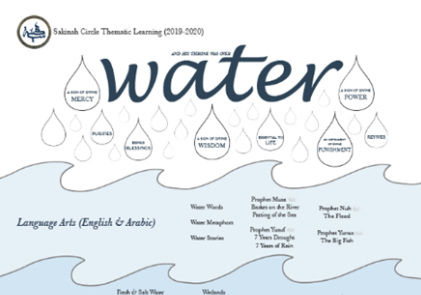Implementation of Transdisciplinary Approaches in Islamic Education to Face Contemporary Global Challenges
DOI:
https://doi.org/10.47453/eduprof.v6i2.283Keywords:
Transdisciplinary education, Islamic education, global challenges, Sakinah Circle, Holistic learningAbstract
This research aims to explore the application of a transdisciplinary approach in Islamic education, with a focus on its integration with contemporary global challenges, such as social, environmental, and technological issues. This study uses a qualitative method with a literature study approach. Data is collected from a variety of secondary sources, such as books, journal articles, and official documents. Data analysis was carried out thematically to find patterns and relationships between transdisciplinary approaches and Islamic education. The focus of the research is the theoretical exploration of transdisciplinary education in the Islamic context. The findings show that the transdisciplinary approach at Sakinah Circle successfully integrates various disciplines such as science, mathematics, history, and language with Qur'anic values. Each theme taught, such as "Water" and "Samawat", provides a holistic learning experience, combining scientific, spiritual, and ethical dimensions. This approach prepares students to face contemporary challenges by fostering intellectual and spiritual development simultaneously. This research highlights the important role of a transdisciplinary approach in modernizing Islamic education to confront global issues such as environmental sustainability and social inequality. The study also demonstrates the need for institutional support in implementing this approach, as well as suggesting that transdisciplinary learning can enhance critical thinking skills, creativity, and collaboration in the context of Islamic education. This research makes an original contribution by linking the transdisciplinary approach to Islamic education, emphasizing its potential in bridging the gap between traditional religious teachings and the demands of the 21st century. This research offers a new perspective on how Islamic education can evolve to face global challenges while maintaining its core values.
References
Abdullah, M Amin, ‘Religion, Science, and Culture: An Integrated, Interconnected Paradigm of Science’, Al-Jami’ah: Journal of Islamic Studies, 52.1 (2014), pp. 175–203, doi:10.14421/ajis.2014.521.175-203
Arim, S N, M T Ajmain, K Abdul Razak, M N Mohamad Salleh, A S Yusof, and S S Mohd Noor, ‘Navigating Educational Turbulence: A Systematic Literature Review on Challenges Faced by Islamic Education Amid the Pandemic’, in Studies in Systems, Decision and Control, 2024, DXXXVII, 663–80, doi:10.1007/978-3-031-62106-2_50
Arnold, M G, ‘The Challenging Role of Researchers Coping with Tensions, Dilemmas and Paradoxes in Transdisciplinary Settings’, Sustainable Development, 30.2 (2022), pp. 326–42, doi:10.1002/sd.2277
Atta, I S, and R A Alzahrani, ‘Perception of Pathology of Otolaryngology-Related Subjects: Students’ Perspective in an Innovative Multidisciplinary Classroom’, Advances in Medical Education and Practice, 11 (2020), pp. 359–67, doi:10.2147/AMEP.S256693
Block, T, C Prové, M Dehaene, P V Abeele, and L Beeckmans, ‘Understanding Urban Sustainability from Mode 2 Science and Transdisciplinary Education: How Master Thesis Ateliers of the Ghent Stadsacademie Tackle Wicked Issues’, Environment, Development and Sustainability, 2022, doi:10.1007/s10668-022-02657-0
Budwig, N, and A J Alexander, ‘A Transdisciplinary Approach to Student Learning and Development in University Settings’, Frontiers in Psychology, 11 (2020), doi:10.3389/fpsyg.2020.576250
Dhanarajan, D G, ‘Partnerships for Change’, in Leadership for 21st Century Learning: Global Perspectives from International Experts, 2013, pp. 177–86, doi:10.4324/9781315042329-24
Ertas, A, K M Frias, D Tate, and S M Back, ‘Shifting Engineering Education from Disciplinary to Transdisciplinary Practice’, International Journal of Engineering Education, 31.1 (2015), pp. 94–105
Fitri, A Z, M Nafis, and L Indarti, ‘Multidisciplinary, Interdisciplinary, and Transdisciplinary (MIT) Learning Approach and Strategy Based on Indonesian National Qualification Framework (KKNI) Curriculum’, Ulumuna, 24.1 (2020), pp. 183–204, doi:10.20414/ujis.v24i1.375
Godemann, J, ‘Knowledge Integration: A Key Challenge for Transdisciplinary Cooperation’, Environmental Education Research, 14.6 (2008), pp. 625–41, doi:10.1080/13504620802469188
Gröschl, S, and X Pavie, ‘Transdisciplinarity Applied to Management Education: A Case Study’, Journal of Education for Business, 95.7 (2020), pp. 451–57, doi:10.1080/08832323.2019.1671781
Klein, J T, ‘Learning in Transdisciplinary Collaborations: A Conceptual Vocabulary’, in Transdisciplinary Theory, Practice and Education: The Art of Collaborative Research and Collective Learning, 2018, pp. 11–23, doi:10.1007/978-3-319-93743-4_2
Kubisch, S, S Parth, V Deisenrieder, K Oberauer, J Stötter, and L Keller, ‘From Transdisciplinary Research to Transdisciplinary Education-the Role of Schools in Contributing to Community Well-Being and Sustainable Development’, Sustainability (Switzerland), 13.1 (2021), pp. 1–13, doi:10.3390/su13010306
Kumar, R, E T Ong, S Anggoro, T L Toh, and M Fukui, Transdisciplinary Teaching and Technological Integration for Improved Learning: Case Studies and Practical Approaches, Transdisciplinary Teaching and Technological Integration for Improved Learning: Case Studies and Practical Approaches, 2024, doi:10.4018/979-8-3693-8217-2
Kveraga, R, and S B Jones, ‘Improving Quality Through Multidisciplinary Education’, Anesthesiology Clinics, 29.1 (2011), pp. 99–110, doi:10.1016/j.anclin.2010.11.004
Lavrinoviča, B, ‘Transdisciplinary Learning: From Transversal Skills to Sustainable Development’, Acta Paedagogica Vilnensia, 47 (2021), pp. 93–107, doi:10.15388/ActPaed.2021.47.7
Nasr, S.H., Islamic Science: An Illustrated Study (World Wisdom, 2003)
Panciera, S D P, B B R Valverde, and A P S Jurdi, ‘Human Development and Interdisciplinary Education: The Confluence between Psychology and Occupational Therapy Courses’, Interface: Communication, Health, Education, 25 (2021), pp. 1–12, doi:10.1590/interface.200208
Pervez, S, ‘Muslim Intellectual History: A Survey’, American Journal of Islam and Society, 39.3–4 (2022), pp. 206–72, doi:10.35632/ajis.v39i3-4.2332
Rajnath, Y K K, ‘Institutional Support and Leadership for Transdisciplinary Education’, in Transdisciplinary Approaches to Learning Outcomes in Higher Education, 2024, pp. 296–326, doi:10.4018/979-8-3693-3699-1.ch009
Rohman, A, G Meraj, A Isna, M M Taruna, A Rachmadhani, and N E Atmanto, ‘Challenges in Islamic Education Curriculum Development: A Comparative Study of Indonesia, Pakistan, and India’, International Journal of Learning, Teaching and Educational Research, 23.6 (2024), pp. 504–23, doi:10.26803/ijlter.23.6.23
Rosenthal, F., The Classical Heritage in Islam (Routledge, 1975)
Ruslan, I, and M A Irham, ‘The Role of Cultural Literacy and Peace Education in the Harmonization of Religious Communities’, Journal of Social Studies Education Research, 13.3 (2022), pp. 174–204
Sabic-El-Rayess, A, ‘Epistemological Shifts in Knowledge and Education in Islam: A New Perspective on the Emergence of Radicalization amongst Muslims’, International Journal of Educational Development, 73 (2020), doi:10.1016/j.ijedudev.2019.102148
Sakinah Circle, Sakinah Circle Handbook (Sakinah Circle, 2010)
———, ‘Themes’, Sakinah Circle, 2024
Salite, I, E Drelinga, D Iliško, E Olehnoviča, and S Zariņa, ‘Sustainability from the Transdisciplinary Perspective: An Action Research Strategy for Continuing Education Program Development’, Journal of Teacher Education for Sustainability, 18.2 (2016), pp. 135–52, doi:10.1515/jtes-2016-0020
Samier, E A, ‘Authentic and Inauthentic Constructions of Islamic Educational Administration and Leadership: Contrasting Discursive Formations of Myths, Assumptions, Stereotypes, and Exclusions’, in The Palgrave Handbook of Educational Leadership and Management Discourse, 2022, pp. 1429–48, doi:10.1007/978-3-030-99097-8_76
Sparkes, A C, and B Smith, ‘Interdisciplinary Connoisseurship in Sport Psychology Research’, in Routledge International Handbook of Sport Psychology, 2016, pp. 581–88
Suchitra, M, G S Prathibha, S Sujata, K Areti, and K K Kadimpati, ‘Transdisciplinary Theories and Models for Understanding Learning Outcomes in Higher Education’, in Transdisciplinary Approaches to Learning Outcomes in Higher Education, 2024, pp. 1–42, doi:10.4018/979-8-3693-3699-1.ch001
Susanto, Susanto, and Arik Dwijayanto, ‘Student’s Attachment to Social Media and the Challenges of Moderate Islamic Education (Implementation During the Covid-19 Pandemic)’, Jurnal Ilmiah Peuradeun, 10.2 (2022), p. 331, doi:10.26811/peuradeun.v10i2.728
Suyadi, ‘Learning Taxonomy of Islamic Education: The Development of Aql and the Brain in Quran from a Neuroscience Perspective’, Millah: Journal of Religious Studies, 21.2 (2022), pp. 361–410, doi:10.20885/millah.vol21.iss2.art3
Suyadi, Zalik Nuryana, and Niki Alma Febriana Fauzi, ‘The Fiqh of Disaster: The Mitigation of Covid-19 in the Perspective of Islamic Education-Neuroscience’, International Journal of Disaster Risk Reduction, 51 (2020), p. 101848, doi:10.1016/j.ijdrr.2020.101848
Suyadi, Suyadi, and Hendro Widodo, ‘Millennialization of Islamic Education Based on Neuroscience in the Third Generation University in Yogyakarta Indonesia’, QIJIS (Qudus International Journal of Islamic Studies), 7.1 (2019), p. 173, doi:10.21043/qijis.v7i1.4922
Tariq, M U, ‘Enhancing Students and Learning Achievement as 21st-Century Skills through Transdisciplinary Approaches’, in Transdisciplinary Approaches to Learning Outcomes in Higher Education, 2024, pp. 220–57, doi:10.4018/979-8-3693-3699-1.ch007
Tolchah, M, and M A Mu’ammar, ‘Islamic Education in the Globalization Era; Challenges, Opportunities, and Contribution of Islamic Education in Indonesia’, Humanities and Social Sciences Reviews, 7.4 (2019), pp. 1031–37, doi:10.18510/hssr.2019.74141
Tortoriello, F S, and I Veronesi, ‘Internet of Things to Protect the Environment: A Technological Transdisciplinary Project to Develop Mathematics with Ethical Effects’, Soft Computing, 25.13 (2021), pp. 8159–68, doi:10.1007/s00500-021-05737-x
Tripon, C, ‘Challenges of Teaching - Personalized Students Learning by Using Video Tools to Improve Thinking Skills’, in Proceedings of the International Conference on Virtual Learning, 2020, pp. 159–65
Vereijken, M W C, S F Akkerman, S F te Pas, I van der Tuin, and M Kluijtmans, ‘“Undisciplining” Higher Education without Losing Disciplines: Furthering Transformative Potential for Students’, Higher Education Research and Development, 42.7 (2023), pp. 1762–75, doi:10.1080/07294360.2022.2156482
Wognum, N, C Bil, F Elgh, M Peruzzini, J Stjepandić, and W J C Verhagen, ‘Transdisciplinary Systems Engineering: Implications, Challenges and Research Agenda’, International Journal of Agile Systems and Management, 12.1 (2019), pp. 58–89, doi:10.1504/IJASM.2019.098728
Yusmaliana, D, A Kurbiyanto, and G A N Zakaria, ‘Green Minds, Sacred Paths: Nurturing Environmental Affection Through Islamic Education and Creative Imagination’, in World Sustainability Series, 2024, PART F3411, 289–310, doi:10.1007/978-981-97-6639-0_17

Additional Files
Published
How to Cite
Issue
Section
License
Copyright (c) 2025 Authors

This work is licensed under a Creative Commons Attribution-NonCommercial-ShareAlike 4.0 International License.

























